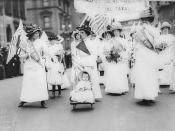In many historical contexts, western feminist movements have demanded women's rights on the basis of gender difference. In the nineteenth century attributes
specific to gender were socially constructed. Women's ideal role took place in the private sphere while the public sphere was reserved for men. With the formulation of separate spheres in place, feminist construed their "feminine" qualities to mean moral superiority
over men. Feminist argued that women be admitted to public life and politics based on the presumption that they would improve the establishment, not because they possess a right to equal participation. Accordingly, women would receive the burden of betterment rather that the justice of equality. The logic of inherent differences between women and men also implies that universal qualities apply to all women. In this sense, difference feminism encourages a world wide feminist movement grounded in those qualities innate to all women. Solidarity founded in such gendered characteristics is problematic because it overlooks cultural diversity among women.
In the late nineteenth and early twentieth centuries, the British feminist quest for women's enfranchisement illustrated specifically these elemental problems of difference feminism. I content that by utilizing ideals of difference feminism, the suffragists ultimately limited both the political potential for British women and stereotyped Indian women as inferior.
British feminist suffragism, beginning in the mid-nineteenth century, faced opposition of immense proportions. The ideal of domesticity was mapped onto middle-class English women and enforced stereotypes that placed women in the home functioning as mothers. Politicians valorized motherhood and the private sphere to keep women from entering the public sphere. It was put forth that in the privacy of her home a woman could retain and display her nature: moral purity, delicacy and refinement and that these qualities of feminine nature are the source of female power. Therefore, allowing women to...


